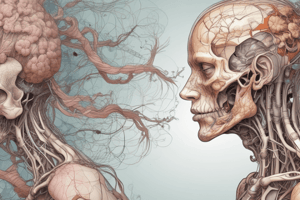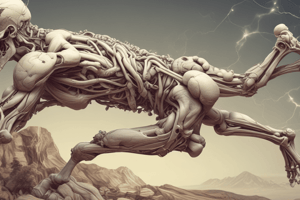Podcast
Questions and Answers
What are you measuring?
What are you measuring?
Diameter
What cell is similar to T cells?
What cell is similar to T cells?
Killer cells
What hormone responds to stress?
What hormone responds to stress?
Cortisol
What hormone helps to regulate sodium?
What hormone helps to regulate sodium?
What skin layer contains dead cells?
What skin layer contains dead cells?
Why is the cell in a hypertonic solution?
Why is the cell in a hypertonic solution?
What releases sodium bicarbonate?
What releases sodium bicarbonate?
If pH changes from 4 to 9, how many times stronger is it?
If pH changes from 4 to 9, how many times stronger is it?
What base pair nucleotides are part of the double strand of DNA?
What base pair nucleotides are part of the double strand of DNA?
What is the pulmonary circuit?
What is the pulmonary circuit?
How do bile salts aid during digestion?
How do bile salts aid during digestion?
What back muscle was injured?
What back muscle was injured?
What are the regions of the tibia and fibula?
What are the regions of the tibia and fibula?
What has the smallest atomic number or mass?
What has the smallest atomic number or mass?
What nourishes and protects sperm?
What nourishes and protects sperm?
Which body system breaks down proteins into amino acids?
Which body system breaks down proteins into amino acids?
What's the function of the circulatory system?
What's the function of the circulatory system?
What is the process of the proximal tubule of the nephron?
What is the process of the proximal tubule of the nephron?
What is the gap between two nerve cells?
What is the gap between two nerve cells?
Histones are associated with which cell?
Histones are associated with which cell?
What cell suppresses immune responses?
What cell suppresses immune responses?
What part of the CNS regulates pituitary glands?
What part of the CNS regulates pituitary glands?
What cell organelle releases energy contained in food?
What cell organelle releases energy contained in food?
Limited UV is better for the production of what vitamin?
Limited UV is better for the production of what vitamin?
What connects the uterus to the vagina?
What connects the uterus to the vagina?
What occurs when the diaphragm contracts?
What occurs when the diaphragm contracts?
Flashcards are hidden until you start studying
Study Notes
Anatomy and Physiology
- Diameter is a key measurement in anatomical structures, often referring to the width of vessels or organs.
- Killer cells are a type of lymphocyte that are similar to T cells and play a crucial role in the immune response.
- Cortisol is a hormone produced in response to stress, helping to regulate metabolism and immune response.
- Aldosterone, produced by the adrenal glands, regulates sodium levels and plays a role in blood pressure control.
Skin and Cellular Biology
- The stratum corneum is the outermost layer of skin, composed of dead cells that provide a protective barrier.
- In a hypertonic solution, water moves out of a cell, resulting in a lower concentration of water inside relative to the outside environment.
Digestive and Excretory Systems
- The pancreas releases sodium bicarbonate, which neutralizes stomach acid in the small intestine.
- Bile salts emulsify fats in the digestive process, breaking down fat globules into smaller droplets for easier absorption.
Cardiovascular and Circulatory Systems
- The pulmonary circuit refers to the pathway in which deoxygenated blood is transported from the right ventricle to the lungs for oxygenation and then returned as oxygenated blood to the left atrium.
Chemical and Biochemical Principles
- A change in pH from 4 to 9 increases acidity strength by 50 times.
- Base pair nucleotides in DNA consist of purines (adenine and guanine) and pyrimidines (cytosine and thymine).
Muscular and Skeletal System
- Latissimus dorsi is a major back muscle that can be prone to injury.
- The tibia and fibula are the primary bones in the leg that support weight and facilitate movement.
Reproductive and Endocrine Systems
- The prostate gland nourishes and protects sperm, playing a vital role in male reproductive health.
- The hypothalamus regulates the pituitary gland's functions, linking the nervous and endocrine systems.
Nervous System
- The synaptic cleft is the gap that separates two nerve cells, facilitating neurotransmission.
- T cells suppress immune responses, maintaining homeostasis and preventing overactive immune functions.
Cellular Organelles
- Mitochondria are organelles responsible for releasing energy stored in food through cellular respiration.
- Histones are associated with eukaryotic cells and are crucial for DNA packaging and regulation.
Vitamin Production and Ultraviolet Light
- Limited exposure to UV light is beneficial for the production of vitamin D, essential for bone health.
Reproductive Anatomy
- The cervix connects the uterus to the vagina, playing a critical role during childbirth and menstrual processes.
Studying That Suits You
Use AI to generate personalized quizzes and flashcards to suit your learning preferences.





